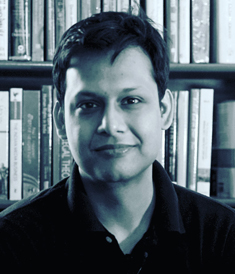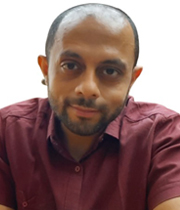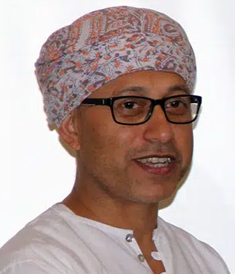Technology as a Public Good
Talk Title, Abstract & Bio of Speakers

Apar Gupta
Presentation Schedule: 2.05 PM - 2.25 PM
Talk Title: Digitisation as challenger to India's constitutional framework
Abstract: Successive governments have prioritised increasing tele-connectivity, open data platforms and digital identity in India. These have resulted in mass internet access and use of technology in governance. Policy design has also de-prioritised an emphasis on fundamental rights. This is most tangibly perceptible in areas of free expression and privacy. The end result of relentless digitisation has resulted in harms that have ultimately challenged the democratic framework of India towards greater aggregation of power towards Governments and private beneficiaries of policy largesses.
Bio: Apar Gupta is a lawyer qualified to practice in India with a masters degree from the Columbia University School of Law, New York. He is the Executive Director of the Internet Freedom Foundation, a digital rights advocacy organisation in India for which he has been awarded the Ashoka Fellowship in 2019. His work is focussed at the intersection of technology and civil rights through strategic litigation in cases such as Shreya Singhal v. Union of India, Anuradha Bhasin v. Union of India and Justice Puttaswamy v. Union of India. This is complemented with online campaigns and civic literacy efforts such as the one for Network Neutrality under the SaveTheInternet.in, or for data protection laws under SaveOurPrivacy.in. He has also deposed before Parliamentary Committees of Information Technology and Science and Technology to inform topics of study including Internet Shutdowns, online obscenity and the DNA Bill. Apar has also drafted legislative proposals that have been introduced as private member bills on decriminalisation of defamation, data protection and surveillance reforms.

Dr. Sambuddho Chakravarty
Presentation Schedule: 2.25 PM - 2.45 PM
Talk Title: How the Internet Iron Curtain Works and What Are We Doing About It
Abstract: The Internet, historically incepted as the ARPANET, was engineered to serve as means of communication, even in the face of calamities and wars. Political will often play antithetical to this very attribute. For instance, countries like China, Iran, and UAE use (homebrewed) firewalling infrastructure to censor web traffic -- sometimes with the pretext of preserving cultural and religious values, at other times to prevent political dissent. No wonder a large body of network censorship measurements focuses on such countries. While such countries are inherently (constitutionally) undemocratic, ``free speech'' over the Internet is, in recent years, being regularly suppressed even in democracies like India. Such evolutions are positioned on concerns otherwise paramount to the preservation of human rights -- e.g., policing child pornography. But state control of communication channels has been abused to silence dissent, even in India where the supreme court deems freedom of speech on the Internet a fundamental right. In this context, it is natural to ask how free and open is the Internet and how robust it is to censorship by countries like India, that in recent years has evolved a sophisticated censorship infrastructure.
In this talk, I would begin by giving an overview of how web censorship works and is implemented, and conventional ways to bypass it. Thereafter, I talk of a new system Dolphin, which emulates old school dial-up modems, sans the ISP support, to relay Internet traffic, especially in the face of Internet shutdowns. Dolphin's protocol recovers from the losses and errors introduced by the cellular voice medium, while also assuring end-to-end confidentiality. At low data rates (<=64bps), the errors are under 5% and suitable for supporting delay-tolerant applications with acceptable latencies. E.g. a 280 character tweet can be posted in about a minute.
Bio: Sambuddho Chakravarty completed his Ph.D. in Computer Science from Columbia University in 2014. He was advised by Prof. Angelos D. Keromytis. His research focuses on Network Anonymity and Privacy, Network Surveillance and Anti-Censorship and Network and Distributed Systems Security in general. During his Ph.D. he studied novel practical traffic analysis vulnerabilities of popular anonymity networks like Tor. He has served an intern at Telcordia Applied Research, New Jersey and Force 10 Networks, California.

Urvashi Aneja
Presentation Schedule: 2.45 PM - 3.05 PM
Talk Title: Rethinking AI , Innovation and Governance
Abstract: The talk will discuss dominant approaches to AI governance and suggest that while these approaches are important and necessary, they do not adequately address the core challenges around ethics, power, and community. Alongside‘problem solving’ approaches that focus on reducing the harm produced by AI systems, we also need ‘problem diagnosis' approaches that examine how current AI imaginaries and economies have arisen. This can help to develop more systemic and emancipatory ways to align AI innovation trajectories with societal wellbeing.
Bio: Urvashi Aneja is the founding director of Digital Futures Lab. Her current work examines the ethics and governance of AI in the global south; digital public infrastructure and platforms for public service delivery; and labour rights and wellbeing.
Her research has been cited in leading national and global media publications, including the BBC, Reuters, and the Economic Times, and she has served on expert committees constituted by the Indian government on artificial intelligence and frontier technologies.
She is also a Fellow at Chatham House and a Non-Resident Fellow at the Indian Institute of Technology, Mumbai.
From 2017 to 2021, Urvashi was the Founder and Director of Tandem Research, an interdisciplinary research collective working at the interface of technology, society and sustainability.
Urvashi has eight years of teaching experience, as a Lecturer at St. Hilda's College at the University of Oxford and as an Associate Professor of International Relations at the OP Jindal Global University.
Urvashi has a PhD from the Department of Political Science and International Affairs, University of Oxford, UK, and a BA in Philosophy and Literature from the Utrecht University, The Netherlands.

Osama Manzar
Presentation Schedule: 3.05 PM - 3.25 PM
Talk Title: Digital Dichotomy of Unconnected
Abstract: This talk will focus on how technology in today's time is all digital making internet access a basic necessary infrastructure. It further examines the implications of being connected and unconnected in relation to existing public good like education, health, government welfare schemes, financial services and livelihood.
Bio: Osama Manzar is Senior Ashoka Fellow and British Chevening Scholar who founded Digital Empowerment Foundation which has empowered more than 25 million people in India and several global south. He has served on various committees at MeiTY, MIB, CII, and served on the boards of APC, World Summit Awards, World Wide Web Foundation’s A4AI, Down To Earth, and many more.
